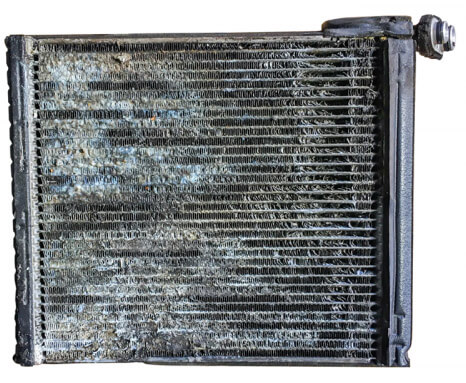Why your AC blows warm at stops but cold when driving
4 Reasons Why Your AC Blows Warm At Stops but Cold When Driving
Here are the four most common reasons why your car’s AC blows warm at stops but cools down as soon as you start driving. Some of these you can check and fix yourself. For the rest you’ll need a manifold gauge set.
Your vehicle’s AC blows warm at stops if:
• Your radiator or condenser fans aren’t working properly
• The AC system is low on refrigerant charge
• Your Compressor Clutch isn’t working properly
• The condenser fins are blocked with crud
• A combination of some or all of the above issues
1. Why a bad condenser fan causes warm AC
Airflow across the condenser removes heat from the hot refrigerant gas and that causes it to condense back into a liquid. When the vehicle is in motion, the “ram airflow” across the condenser removes heat from the hot refrigerant. But when you’re stopped, the condenser/radiator is supposed to take over, pulling air across the condenser to remove the heat. If the fan isn’t working, it can’t cool the refrigerant and you get warm air in the cabin.
Some vehicles are equipped with a condenser fan and a separate radiator fan. In those vehicles, the condenser fans run the entire time the AC is on, and the radiator fan only runs when the engine reaches a specific temperature. Other vehicles have a single variable speed fan. If the condenser fan isn’t working or the variable speed fan doesn’t run or doesn’t run at the proper speed when the AC is on, the refrigerant won’t condense properly and you won’t get cabin cooling when the vehicle is stopped.
So checking for the proper condenser/radiator fan operation is your first step. Start by running the engine and turning the AC setting to MAX. Then check under the hood to see if the condenser/radiator fan is running at full speed. If it’s not, check for any loose wires/connectors right at the fan. Next, inspect the fan’s fuses. If the fan(s) don’t spin and the wiring and fuses are good, take the vehicle to a shop for further diagnosis.
2. Low engine coolant and/or low refrigerant level
Low engine coolant
The AC condenser sits in front of the vehicle’s radiator, so the air coming into the radiator fins is already extra how, which puts an added load on the engine’s cooling system. In a properly operating cooling system, the radiator, engine coolant and water pump can handle the extra heat. But if the cooling system is low, the engine can overheat and that can cause major engine damage. If your cooling system is low on coolant and starts to overheat when the vehicle is stopped, the vehicle’s computer will automatically shut off the AC compressor to reduce heat load on the radiator. Then, when yous start driving and more air passes over the radiator, the AC may start working again.
Check the engine coolant level in the coolant reservoir under the hood. If it’s low on coolant, top it off with the recommended coolant. Then check again in another week. If it’s low again, get your vehicle into a shop to locate and fix the coolant leak.
Low refrigerant level
A low refrigerant level will cause low cooling when driving and no cooling when you’re stopped. Your car’s AC is a closed system, so a low refrigerant level means you have a leak which must be repaired before it can be refilled to the proper level.
3. Your compressor clutch isn’t working correctly
The compressor clutch is responsible for engaging the compressor shaft. Should it fail or work intermittently, the conditioning compressor won’t pump refrigerant. Compressor clutch problems are usually caused by a bad relay, a wide air gap, a corroded or frayed wiring harness/connector issue, or a bad clutch coil.
To check if your compressor clutch works, turn the AC to MAX and start the engine. The clutch and the pulley will spin both at the same time. In case only the pulley rotates, check the clutch connector for power. If it’s not getting power, check the relay and fuse.
Loud noises when the AC switches on also indicate a bad compressor. An important point to note is that a faulty compressor clutch affects the AC’s overall performance. It will fail even if the car is moving at a considerably high speed. Furthermore, it is difficult to narrow down the faulty component without visiting a mechanic. In the event of this problem, visit a shop for a thorough prob.
4. Blocked or dirty condenser
Dust particles and road grime can accumulate on the
condenser fins and that reduces airflow and reduce AC performance, especially when you’re stopped. To check for dirty condenser fins, simply shine a flashlight onto the front of the condenser coil. If you see dust, bug or dirt buildup, clean it with a strong spray from a garden hose.
5. A combination of some or all of the above issues
The AC might be malfunctioning because it is experiencing either one or all of the mentioned issues. Check out the problems from the above guidelines and apply the necessary remedies.
Posted on by Rick Muscoplat

